Understanding the Cost of Litter and Budgeting Tips

Among all the factors related to the care of your cat, proper litter is one of the most important ones.
Still, as a cat owner, you should have felt the rising cost of litter over time.
Knowing the real cost of cat litter will help both new and seasoned cat parents make smart choices that benefit both their wallets and felines.
In this article, we’ll help you make the best choice for your household by breaking down the expenses, exploring the many types of litter available, and offering practical budgeting tips.
After all, caring for your cat should be a delight, not a chore.
Table of Contents
Factors That Affect the Prices of Cat Litter
Cat litter can appear to be such a simple product, but in reality, there are many underlying factors contributing to its cost.
From the materials used to the brand and even the environmental impact, knowledge of these elements may enable you to make better choices.
Let’s take a deeper look into some key factors that affect the cost of litter.

Types of Cat Litter and Their Prices
One of the first things you may notice when you go to buy litter is the variety of types available.
Each type has an associated price, depending on the material it’s made of and the benefits it provides.
In order from most to least expensive, common types of cat litter include:
- Clay Litter: Most readily available and cheapest type. It clumps well and is very good at odor control; however, it can be dusty and is not biodegradable.
- Silica Gel Litter: Silica gel crystals are another alternative. More expensive than clay, they offer excellent odor control and last longer, but they are less widely available compared to other types.
- Biodegradable Litter: Biodegradable litter is an environmentally friendly option. These alternatives tend to be more expensive; however, they are gentler on the environment and may appeal to those concerned about sustainability.
- Pine Litter: Pine-based litters are another biodegradable option. These have a natural scent and fall in the mid-range of pricing but may require more frequent changes.
Each of these types has its advantages, but there is a significant price difference between them.
For example, clay litter can be as cheap as $10 per month, while silica or biodegradable options might easily reach $20-$30 per month.
The decision ultimately depends on your cat’s preference, your budget, and your priorities for sustainability.
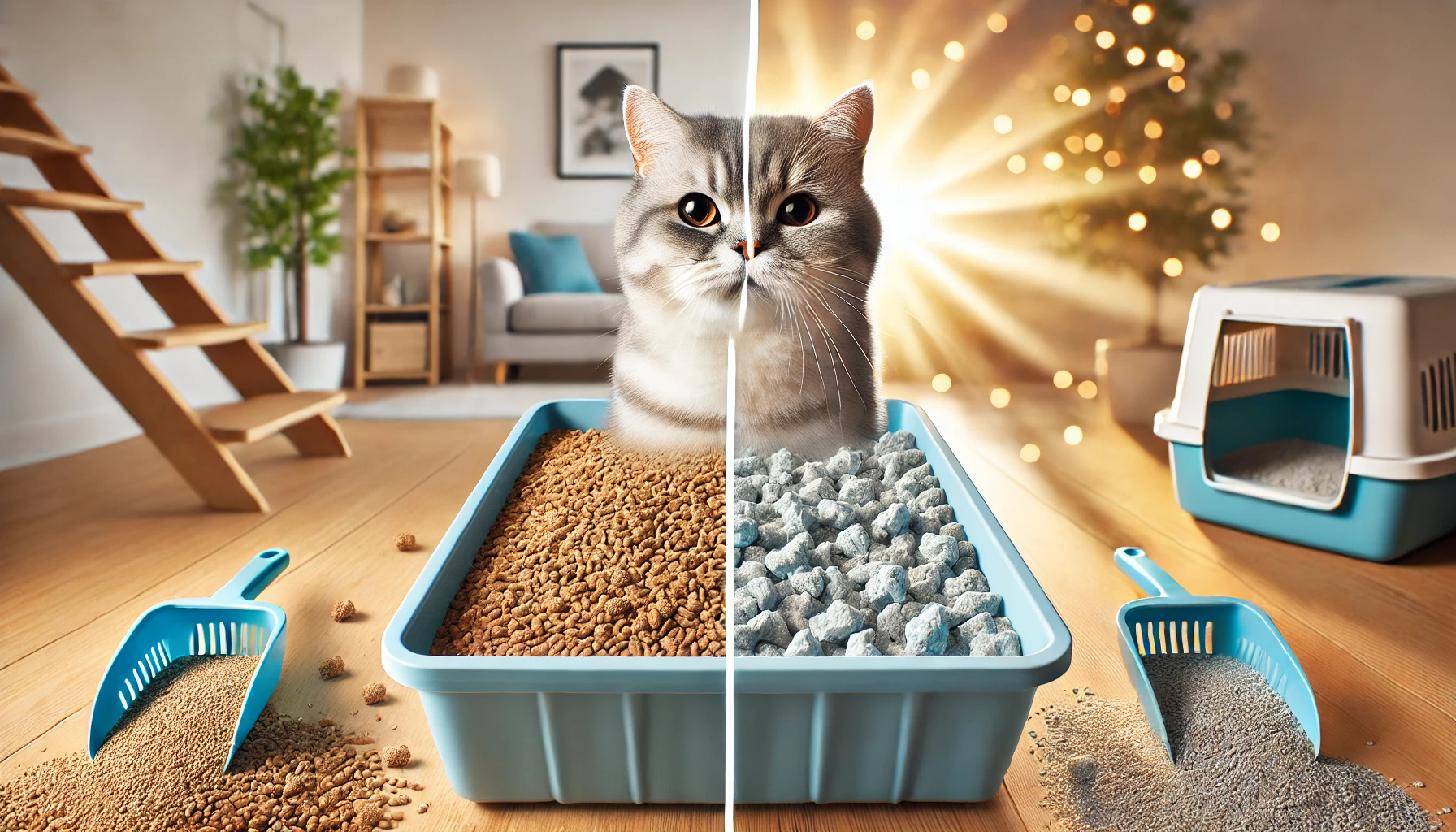
Clumping vs. Non-Clumping: Which One Saves More Money?
You will also need to decide between clumping and non-clumping litter.
Clumping litter is characterized by its ability to absorb moisture and form solid clumps that make scooping easier.
Non-clumping litter absorbs liquid without forming clumps.
But which option is more cost-effective?
- Clumping Litter: Since clumping litter allows you to remove only the waste and not entire sections of litter, it lasts longer. While it may have a higher initial cost, it is generally more economical for many cat owners over time.
- Non-Clumping Litter: Non-clumping litter is usually less expensive upfront but requires more frequent changes. Over time, this adds up, making it less affordable in the long run.
In general, clumping litter is more budget-friendly, especially if you prefer a low-maintenance option.
However, each cat is unique, so it’s important to find what works best for both your feline friend and your budget.
The price of cat litter is influenced by multiple factors, including materials, brand, and environmental impact.
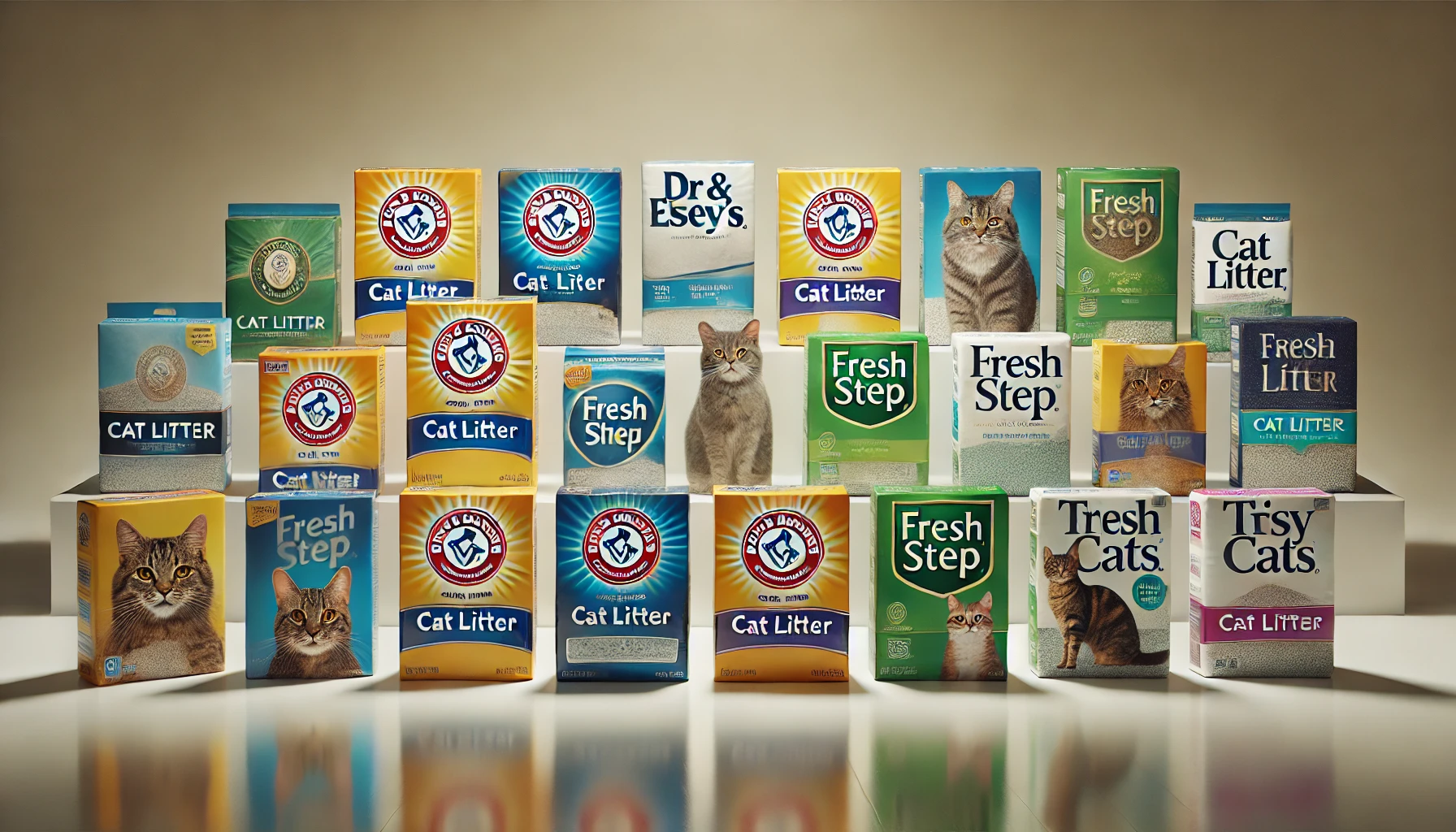
Common Brands of Cat Litter and How Much They Cost
As you go to purchase cat litter, you will find that not all brands are equal.
While some brands are considered premium and come at a higher cost, other brands offer more economical options.
Comparing popular brands in cat litter will help you find a product that meets both the needs of your cat and your wallet.
In this section, we take a closer look at some of the most popular brands and how the products compare based on cost of litter and quality.

Popular Cat Litter Brands: A Price Guide
Below are some of the most commonly used cat litter brands along with their price ranges, according to updated research:
- Arm & Hammer: Best known for odor control, you can typically expect to pay anywhere from $10 to $15 for a 20-pound box of clumping litter. Their natural and biodegradable variants tend to be a bit more expensive.
- Dr. Elsey’s Precious Cat: Many owners swear by the clumping litter from this brand. It usually retails for $15-$20 for a 40-pound bag, offering good value.
- Fresh Step: Fresh Step is especially known for its odor control, and its clumping litters range from $12 to $18 for a 25-pound box, depending on the variety. Their lightweight formulas tend to be on the higher end.
- World’s Best Cat Litter: A high-end, eco-friendly brand made from corn, it costs around $17 to $25 for each 14-pound bag. Though more expensive, its long-lasting formula appeals to those looking for sustainable options.
- Tidy Cats: Tidy Cats offers a range of both clumping and non-clumping litters. Prices range between $10 to $15 for a 20-pound container, although multi-cat formulas may be slightly more expensive.
These prices give a rough idea of the cost of litter for various brands.
Although some premium brands possess added features such as natural ingredients and long-lasting odor control, budget options can still get the job done at a lower price.
It’s worth trying a few to find what suits both you and your cat best.

Premium vs. Budget Brands: What’s the Difference?
Premium cat litter brands usually offer additional features that justify their higher price.
Some of these features may include:
- More effective and longer-lasting odor control.
- Biodegradable materials or eco-friendly sourcing.
- Low-dust or dust-free formulas for better respiratory health.
- Additional ingredients like baking soda or plant extracts to neutralize odors.
Budget brands, on the other hand, focus on basic odor and clumping performance without the higher price tag.
While they may lack the advanced features of premium options, they can still be highly effective, particularly if you’re operating on a tight budget.

Are Eco-Friendly Litters More Expensive?
In general, eco-friendly litters made from natural materials such as corn, wheat, or recycled paper are more expensive than traditional clay-based litters.
These products appeal to cat owners who value sustainability and don’t mind paying extra to reduce their environmental impact.
Although eco-friendly litters may sell for over $20 a bag, they tend to last longer, providing good value over time.
However, prices for eco-friendly litters have become more competitive in recent years as demand for sustainable products has increased.
Shopping around and buying in bulk can also help mitigate the higher cost of litter.
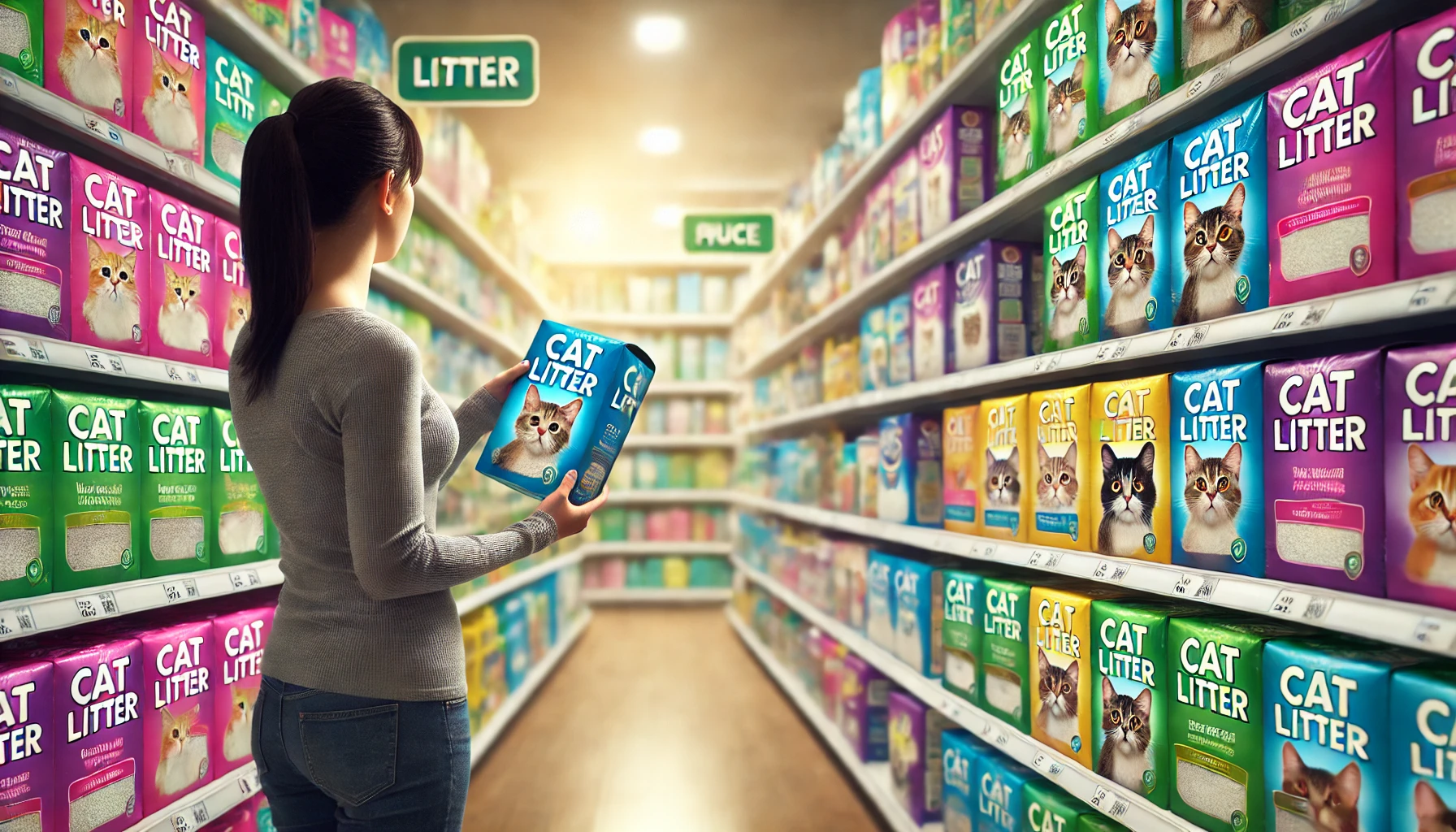
How to Choose a Brand That Fits Your Budget
Here are some tips on how to choose the best cat litter that suits your budget:
- Prioritize your needs: If cost is your primary concern, consider budget brands that still offer good performance for clumping and odor control.
- Consider eco-friendliness: If you prefer biodegradable litter, you may need to pay more. You can save by buying in bulk or subscribing to a litter service.
- Test different brands: Every cat is different. Try a few brands to find out your cat’s preference and how long the litter lasts.
The most important thing is finding a cat litter brand that balances your budget with your cat’s comfort and health.
There is a product available to fit every household’s needs.
Comparing popular cat litter brands is key to balancing quality and cost for your household.

Ways to Save Money on Cat Litter
There are many ways to take care of a cat without breaking your wallet, and when buying cat litter, there are usually ways to do so at a lower cost without sacrificing quality.
Whether it’s bulk ordering, subscribing to monthly litter deliveries, or making your own, there are plenty of ways to save on litter costs.
Let’s explore some of the best ways to stretch your budget while keeping your kitty happy and healthy.

Buying in Bulk: Pros vs. Cons
One of the most popular options for saving money on cat litter is to buy in bulk.
Many pet stores and online retailers offer discounts when you purchase in bulk, but is it always worth it?
- Pros: Buying in bulk usually saves you money per pound compared to smaller sizes. It also reduces the frequency of trips to the store or delivery, saving time.
- Cons: You’ll need space to store extra litter, and the initial upfront cost is higher. Additionally, certain litters, especially biodegradable ones, may lose effectiveness if not stored properly.
In the end, bulk buying is worth it if you have the storage space and your cat is consistent in using the same type or brand of litter.
Checking for sales or online deals can also help you save even more.

Discounts for Subscribing to Litter Services
Subscription services for monthly cat litter deliveries are highly valued by many cat owners.
They not only make life easier but also save you money.
Popular services like PrettyLitter, Kitty Poo Club, and Chewy’s Autoship offer significant discounts for subscribers.
- Subscribers typically get 10-20% off the regular price on each order.
- You’ll never have to worry about running out of litter, and most services allow you to adjust delivery frequency based on your needs.
- Subscription services often include promotions, such as free shipping or occasional free bags of litter.
Subscription services help regularize supply and save money on cat litter costs, especially if you’re loyal to a specific brand.

Is Making Your Own Litter Worth It?
For adventurous cat owners, homemade cat litter is another way to save money and reduce waste.
Common materials for DIY litter include shredded newspaper, wood pellets, and chicken feed pellets.
- Shredded Newspaper: Free if you have old newspapers lying around. However, it doesn’t clump, and you’ll need to change it frequently to control odor.
- Wood Pellets: Originally designed for heating stoves, wood pellets can be used as litter. They break down into sawdust when wet and are inexpensive and biodegradable.
- Chicken Feed Pellets: Surprisingly, some people use these as a litter alternative. They’re cheap, absorbent, and biodegradable, but they don’t clump.
While DIY solutions may save money, they require more frequent cleaning and may not offer the same odor control as commercial litters.
If you’re willing to put in the effort, homemade litter can be a viable way to cut down on litter costs.

Seasonal Sales and Discounts to Watch For
Another easy way to save on cat litter costs is by watching for seasonal sales and promotions.
Retailers often offer discounts on pet supplies during holidays like Black Friday, Cyber Monday, and National Pet Day.
- Black Friday & Cyber Monday: These are great times to stock up on bulk cat litter and other pet accessories. You can often find steep discounts, free shipping, or buy-one-get-one deals.
- Holiday Sales: Pet stores frequently run promotions during major holidays, especially on essentials like litter when purchased in bulk.
- Coupons and Loyalty Programs: Many pet stores offer loyalty programs or coupon subscriptions, providing special discounts for members or first-time shoppers.
By timing your purchases with these promotions, you can significantly reduce your cat litter costs throughout the year.
Bulk buying, subscribing to litter services, and DIY alternatives can significantly reduce your overall litter expenses.

The Long-Term Expense of Cat Litter and Budgeting
Cat litter is one of those things that will continuously drain your wallet and add up over time.
While this may seem like a trivial expense, tracking your long-term cat litter costs is crucial to plan an adequate budget.
Knowing how much you’re going to spend on litter over time can help both first-time and seasoned cat owners make smarter financial choices.
Let’s explore how to estimate your annual litter costs, develop a monthly budget, and monitor usage over time to ensure that quality and cost are well balanced.

Calculating Your Annual Litter Costs
The first step in estimating how much you spend on cat litter within a year is to determine how much litter your cat uses each month.
The quantity depends on several factors, such as the type of litter you are using, the number of cats in your household, and whether the litter is clumping or non-clumping.
Here’s how to make an estimate:
- Single-Cat Household: On average, a single cat uses about 20 to 30 pounds of clumping litter per month, which could cost anywhere from $10 to $30, depending on the brand.
- Multi-Cat Household: If you have multiple cats, your litter consumption will increase. A two-cat household could use about 40-60 pounds of litter monthly, with costs ranging from $20 to $60 per month.
- Eco-Friendly or Premium Litter: If you opt for biodegradable or premium litter, your costs may be higher. Eco-friendly litter, such as those made from corn or recycled paper, could cost around $15 to $40 per month per cat.
Once you have your monthly estimate, multiply it by 12 to calculate your annual cat litter costs.
For example, if you spend $20 per month on litter, your annual cost would be $240.
Tracking these numbers can help you prepare for fluctuations in costs throughout the year, such as seasonal sales or price increases.

How to Set a Monthly Budget for Cat Litter
After determining your annual expenses, it’s helpful to break them down into a monthly budget.
Here are some tips on how to set a reasonable budget:
- Consider Your Cat’s Needs: Cats with health issues or sensitivity to odors may require more frequent litter changes, increasing your monthly budget. Others may be fine with less frequent changes, allowing you to save.
- Choose the Right Litter: Select a litter that offers a good balance between cost and performance. While premium litters may offer superior odor control, they might be overkill for single-cat households.
- Track Seasonal Sales: Plan your budget to take advantage of seasonal sales so you can stock up when litter is at its cheapest, helping to reduce long-term costs.
By setting a monthly budget, you can prepare in advance and avoid unexpected expenses, making it easier to manage the overall cost of litter.

Tracking Litter Usage Over Time
Tracking your cat litter costs regularly will help you better understand your spending.
Keeping a simple log of how often you purchase litter and how much you use each month can provide valuable insights into whether changes in your cat’s behavior or your budget are necessary.
- App/Spreadsheet: Use a spreadsheet or budgeting app to track your litter purchases and usage patterns. This will allow you to see trends and adjust your spending as needed.
- Watch for Changes in Usage: If your cat starts using more or less litter than usual, it may indicate a health issue or the need to switch to a different type of litter.
- Plan for Extra Costs: In multi-cat households or with senior cats, litter usage may increase, so tracking this data helps you plan for potential higher costs.
By tracking your usage, you can better anticipate future cat litter costs and adjust your budget accordingly while ensuring a healthy environment for your feline companion.

Quality vs. Cost: How to Save More
In budgeting for cat litter, there’s often a trade-off between cost and quality.
While cheaper litters may reduce upfront costs, they might need more frequent changes or offer poorer odor control, leading to higher costs in the long run.
Here are some suggestions to help balance quality and cost:
- Mid-Range Brands: Mid-range litters often provide a good balance between price and performance, offering decent odor control and clumping without the premium price tag.
- Invest in a Litter Mat: A quality litter mat can reduce the amount of litter your cat tracks outside the box, saving you from needing to replace it as often.
- Experiment with Different Types: Switching to a different type of litter, such as clumping versus non-clumping, can significantly reduce usage and overall costs.
By balancing quality with cost, you can keep your cat comfortable while maintaining your cat litter costs at a manageable level for the long term.
Tracking your annual cat litter expenses can help you set a monthly budget and prepare for fluctuations in pricing throughout the year.

Environmental and Health Concerns with Cat Litter
The idea of searching for or choosing cat litter should be viewed with consideration of two important aspects: the impact on the environment and the health of your cat.
The quality of litter affects your cat’s respiratory health, contributes to waste management that affects the environment, and even impacts indoor air quality.
Eco-friendly and non-toxic litters are growing in popularity as more owners seek to lessen their ecological footprint while ensuring their cat’s health.
In this section, we will discuss various litter types regarding environmental impact, your cat’s health, and ways to control odor without blowing the budget.
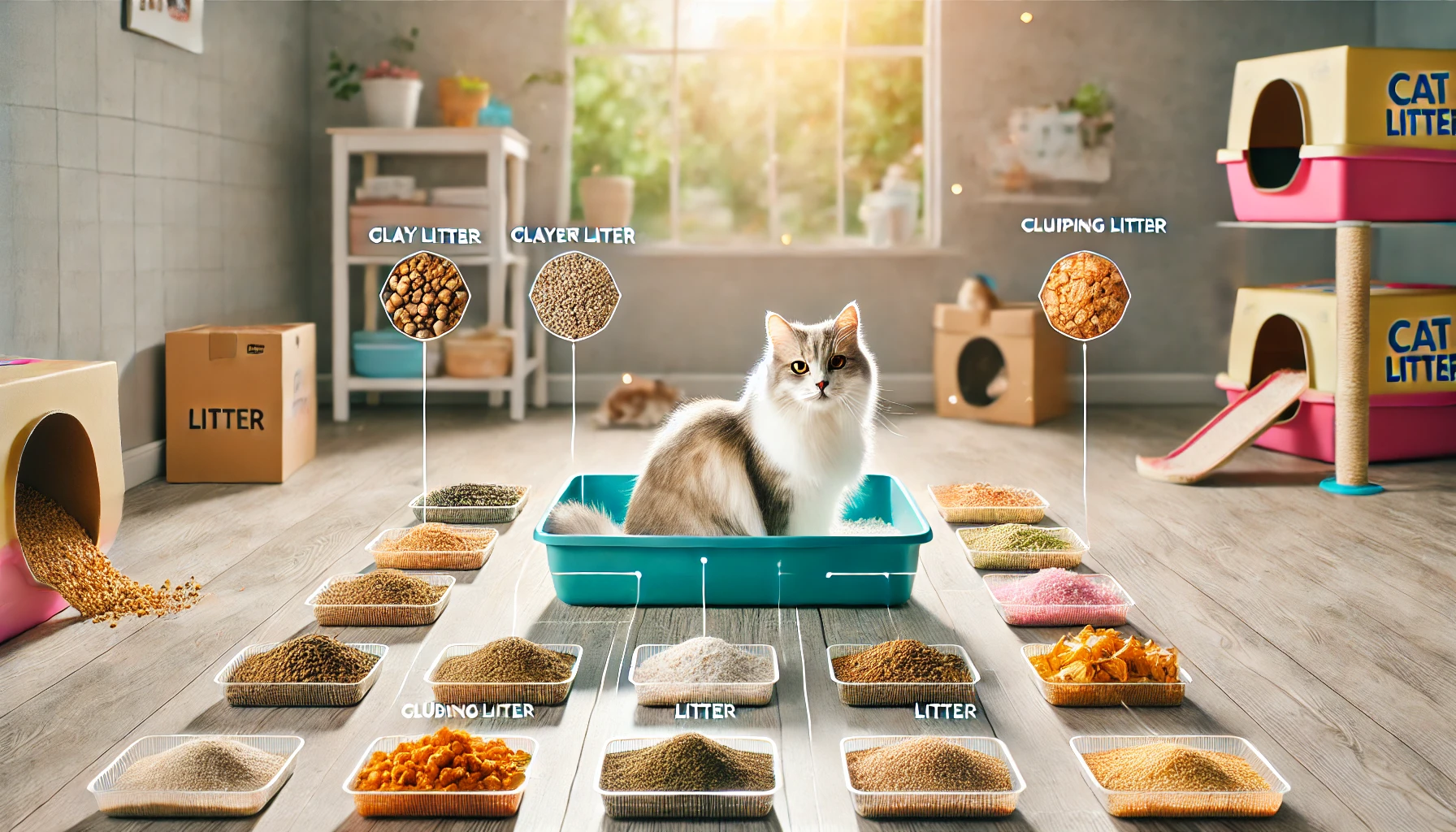
How the Type of Litter Can Affect Your Cat’s Health
Your cat’s litter can significantly affect their respiratory and overall health.
Some litters—especially extremely dusty ones—can irritate your cat’s lungs or worsen conditions like asthma.
Here’s how common litter types may affect your cat’s health:
- Clay Litter: Traditional clay-based litters, especially clumping varieties, tend to kick up a lot of dust, which can exacerbate respiratory issues in both cats and their owners. Opting for a low-dust formula can reduce these concerns.
- Silica Gel Litter: Silica gel crystals are low in dust and less likely to cause respiratory problems. Although there are long-term safety concerns regarding inhaling silica dust, the risks are generally low.
- Biodegradable Litter: Litters made from natural materials like corn, wheat, or recycled paper are typically very low in dust and free from harmful chemicals. These are excellent options for cats with respiratory sensitivities.
- Pine Litter: Pine-based litters are another natural option. They produce minimal dust and are chemical-free, making them suitable for cats with allergies or asthma.
If your cat has any respiratory issues, it’s best to choose low-dust or hypoallergenic litters.
Regularly cleaning the litter box and ensuring proper ventilation in the area where the litter box is kept will also help maintain better air quality.

Biodegradable and Sustainable Litter Alternatives
With the rise in environmental sustainability, many cat owners are switching to biodegradable and sustainable litters.
These litters are made from renewable or recycled materials and decompose naturally over time, reducing the amount of waste sent to landfills.
Below are a few popular litter alternatives that are more environmentally friendly:
- Corn-Based Litter: Made from ground corn, it is highly absorbent, clumps well, and is biodegradable. It’s compostable and gentle on the environment.
- Wheat-Based Litter: This biodegradable option provides natural clumping and odor control. It’s also flushable, adding to its convenience.
- Recycled Paper Litter: Made from recycled paper, this litter is soft on your cat’s paws, biodegradable, and produces little to no dust. However, it doesn’t clump as well as other options.
- Pine Litter: Pine-based litter is made from natural pine fibers, is biodegradable, and controls odors well. It’s also low in dust.
Although biodegradable litters may require a higher initial investment, many of them last longer, making them more economical in the long run.
They’re ideal for cat owners who are ecologically conscious and willing to reduce their cat litter costs through sustainable options.
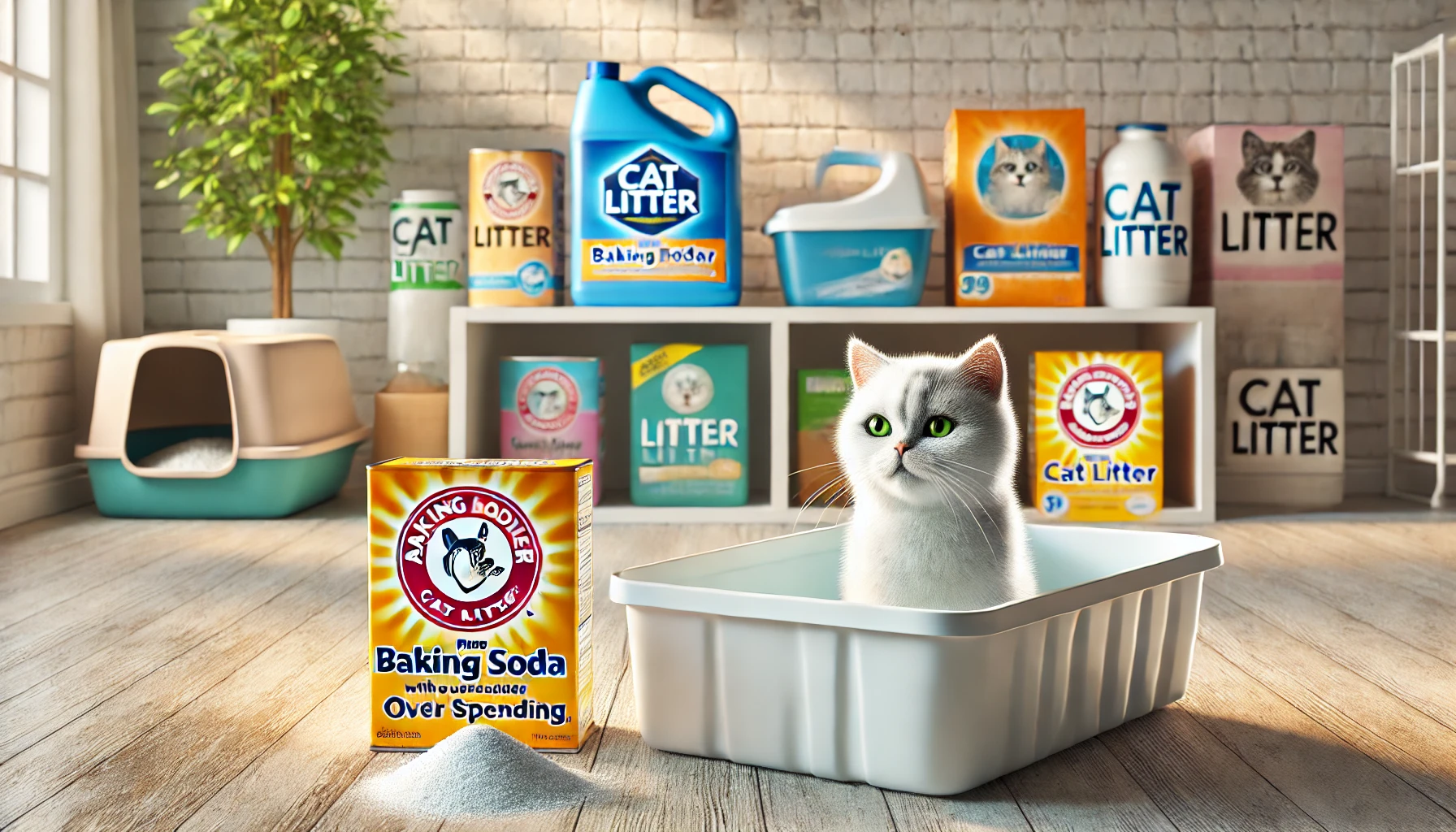
Managing Odor Without Overspending
Odor control is one of the most important aspects of litter box management, but it doesn’t have to be expensive.
Here are some affordable ways to keep your litter box fresh and odor-free:
- Clean Regularly: Scooping the litter box daily removes waste and prevents the buildup of bacteria that causes odors. This also extends the life of your litter.
- Use Baking Soda: Sprinkle a small amount of baking soda at the bottom of the litter box before adding new litter. It’s an inexpensive yet effective way to neutralize odors.
- Consider a Covered Litter Box: Covered litter boxes can help trap odors, but they might not be suitable for every cat. Make sure the box has proper ventilation to avoid trapping ammonia fumes inside.
- Buy Odor-Control Litter: Many litters contain added odor-control agents like activated charcoal or baking soda. While these litters may be slightly more expensive, they can save money in the long run by reducing the frequency of litter changes.
By following a regular cleaning schedule and using simple odor-control methods, you can keep your home smelling fresh while keeping your cat litter costs under control.

Disposal Costs and Best Practices
Proper disposal of cat litter not only helps maintain cleanliness in your home but also has environmental implications.
Most traditional clay and clumping litters are non-biodegradable, contributing to landfill waste.
Here are some tips for proper litter disposal and best practices to reduce your ecological footprint:
- Biodegradable Litter Disposal: If you use biodegradable litter, consider composting it. However, only compost it in a separate compost pile for non-edible plants, as cat feces may contain parasites.
- Do Not Flush Traditional Litter: Never flush traditional clay-based or clumping litters, as they can clog pipes and damage plumbing systems. Dispose of them in the trash.
- Use Biodegradable Bags: When cleaning the litter box, use biodegradable bags to dispose of waste and reduce the amount of plastic waste going into landfills.
By being mindful of your litter’s environmental impact and following best practices, you can reduce your cat’s ecological footprint while managing cat litter costs effectively.
When selecting litter, consider both the environmental impact and how the litter may affect your cat’s respiratory health.

Conclusion on Understanding the Cost of Litter and Budgeting
Every litter is different, and the cost of litter will vary depending on the type you choose.
While the cost of litter might seem small, it can add up quickly, impacting your budget.
Knowing the available options, understanding their environmental and health implications, and learning how to save money through bulk buying, subscription services, and seasonal sales will help you make an informed decision that benefits both your wallet and your cat.

Balancing Costs and Quality in Cat Litter
In litter selection, cost and quality often move in opposite directions.
Premium litters can offer improved odor control and last longer, but they come with a higher price tag.
On the other hand, budget-friendly alternatives may be cheaper upfront but require more frequent changes or lack some of the advanced features found in premium products.
It’s essential to find an option that best suits your cat and household without compromising on comfort or health.
Remember the following when balancing cost with quality:
- Mid-range brands often offer a good balance between performance and price.
- Buying in bulk or subscribing to litter services can reduce long-term costs.
- Eco-friendly options may cost more initially but are sustainable and last longer.
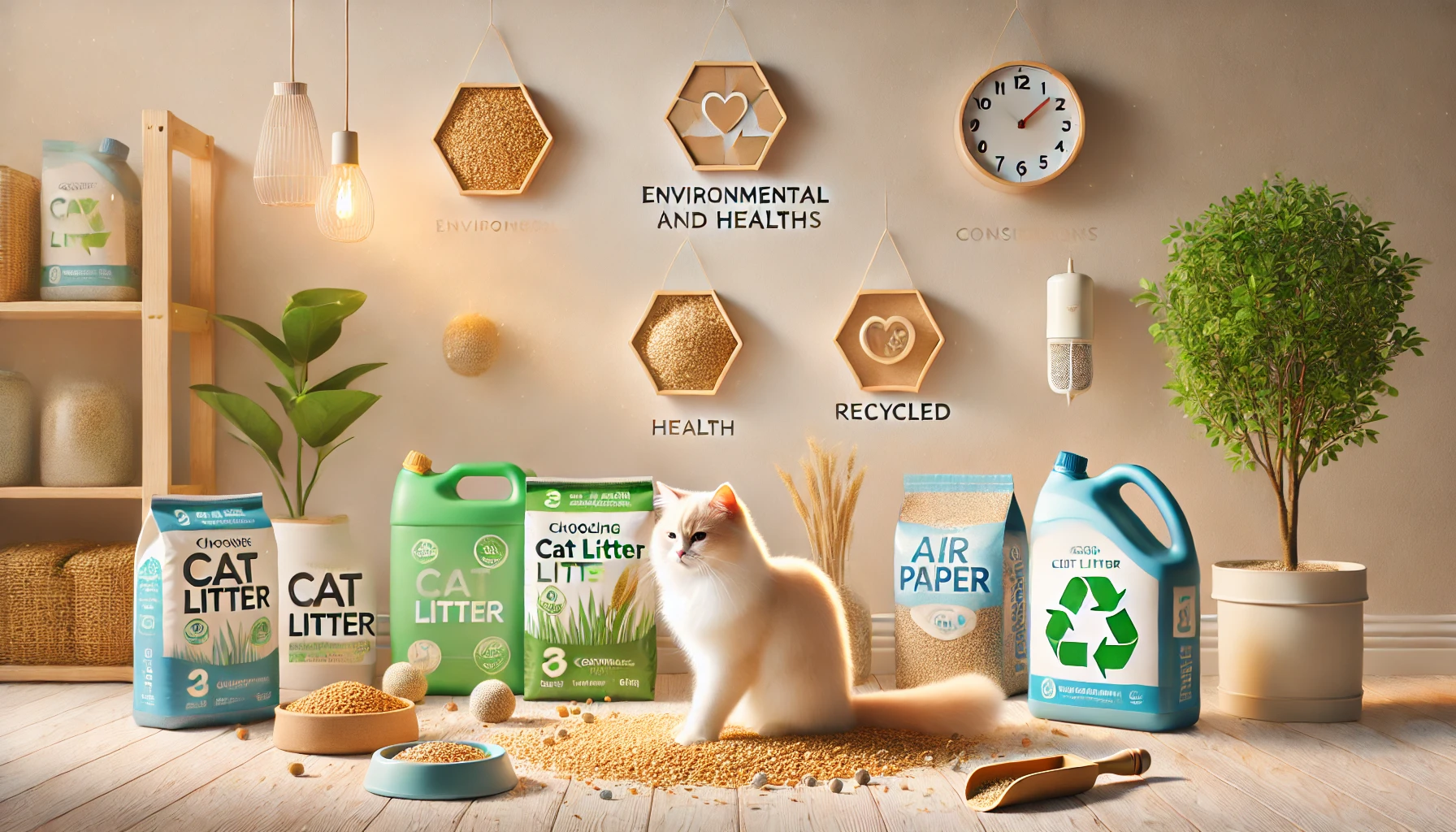
Environmental and Health Considerations
As more cat owners become environmentally conscious, the ecological footprint of cat litter is playing an increasingly important role.
Biodegradable and sustainable options can help reduce your environmental impact without sacrificing performance.
Additionally, your cat’s health is significantly influenced by the type of litter you choose.
Dusty litters can exacerbate respiratory issues in sensitive cats, making low-dust, hypoallergenic, or chemical-free litters a better option.
Key environmental and health considerations include:
- Biodegradable litters like corn, wheat, and pine are eco-friendly alternatives.
- Low-dust and hypoallergenic options improve air quality for both you and your cat.
- Regular cleaning of the litter box and proper ventilation help maintain good air quality and prevent odors.
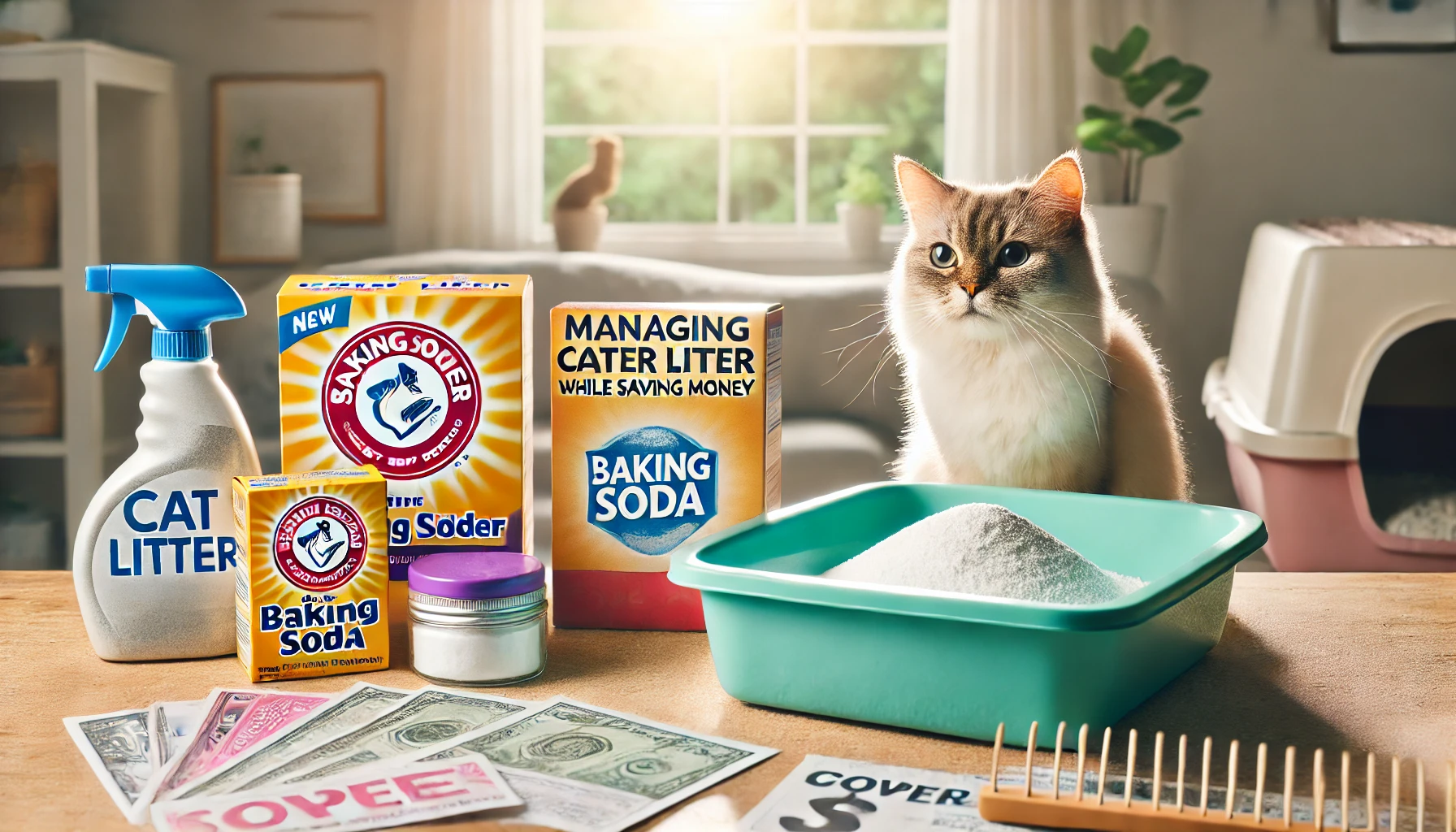
Managing Odor and Saving Money
It’s possible to keep your litter box clean and fresh without overspending.
With some strategic planning, such as tracking seasonal sales, using baking soda to neutralize odors, and choosing odor-control litters, you can keep your home smelling fresh without breaking the bank.
Additionally, investing in a good-quality litter mat and cleaning the litter box frequently can extend the life of your litter and save on replacement costs.

Budgeting for the Cost of Cat Litter Effectively
Once you have a feline friend, it’s essential to budget for cat litter costs.
This will help you avoid any surprises later on.
By calculating how much you’ll spend annually, based on your cat’s needs and litter preferences, you’ll be able to make smarter purchasing decisions and plan your budget for the year.
Don’t forget to adjust your budget for sales and discounts that often occur during high shopping seasons, like Black Friday or Cyber Monday.
Final budgeting tips:
- Track litter usage and adjust your budget to reflect your cat’s habits.
- Invest in higher-quality litters that may not need to be changed as often.
- Take advantage of seasonal discounts to stock up and save money.

Conclusion
Understanding the cost of litter and learning to budget for it is essential for managing your expenses as a cat owner.
By balancing litter type, health concerns, and environmental impact, you can make thoughtful decisions that benefit your cat without draining your bank account.
Whether you choose eco-friendly, premium, or budget-friendly litters, having a clear strategy for buying and maintaining the litter box will ensure your cat has a clean, safe, and comfortable space without excessive spending.
Understanding the different factors that affect litter costs, such as type, brand, and eco-friendliness, can help you make smarter financial choices for your household.

Frequently Asked Questions About the Cost of Cat Litter
Below are some common questions regarding the cost of cat litter and budgeting, with helpful tips on how to manage your expenses while still making good decisions for your feline friend.
How much does cat litter usually cost a month?
The average cost of litter ranges from $10 to $30 per cat per month, depending on the brand and type of litter, and whether you opt for budget or premium options.
How often should I change my cat’s litter?
For clumping litters, scoop daily and perform a full change every 2 to 4 weeks.
Non-clumping litters may require more frequent full changes, typically once a week or every other week.
Is buying cat litter in bulk worth it?
Buying in bulk can reduce your overall cat litter costs by providing better savings per pound.
However, ensure you have enough storage space and choose litters that last longer.
Are eco-friendly litters more expensive compared to regular ones?
Eco-friendly litters may be more expensive initially but tend to last longer and are more environmentally friendly, making them a worthwhile long-term investment for both your cat and the planet.
What are the best ways to lower cat litter costs?
To save on cat litter costs, buy in bulk, subscribe to delivery services for discounts, and monitor seasonal sales.
You can also extend the life of your litter by using odor-control methods like baking soda.
Can I use baking soda in my cat’s litter box?
Yes, sprinkling a small amount of baking soda at the bottom of the litter box can help neutralize odors without harming your cat.
It’s a cost-effective way to keep the litter box fresh.
What is the best litter for cats with respiratory issues?
Low-dust or hypoallergenic litters made from pine, recycled paper, or other biodegradable materials are ideal for cats with respiratory problems, as they minimize irritation and dust.
When should I change my cat’s litter?
If odors persist, clumping becomes excessive, or visible wetness appears in the litter, it’s time for a change to maintain hygiene and comfort for your pet.
Are subscriptions for cat litter worth it?
Subscription services can save money and offer convenience, especially for those who prefer regular deliveries and discounts.
They also reduce the need for frequent trips to the store or reordering.





